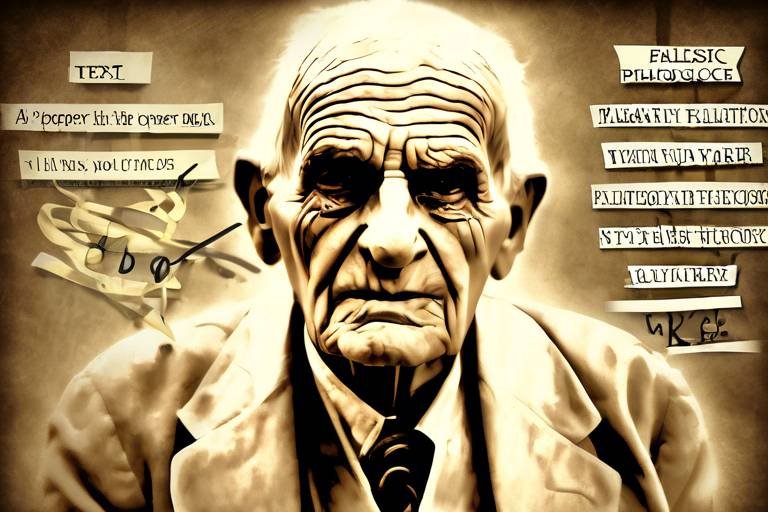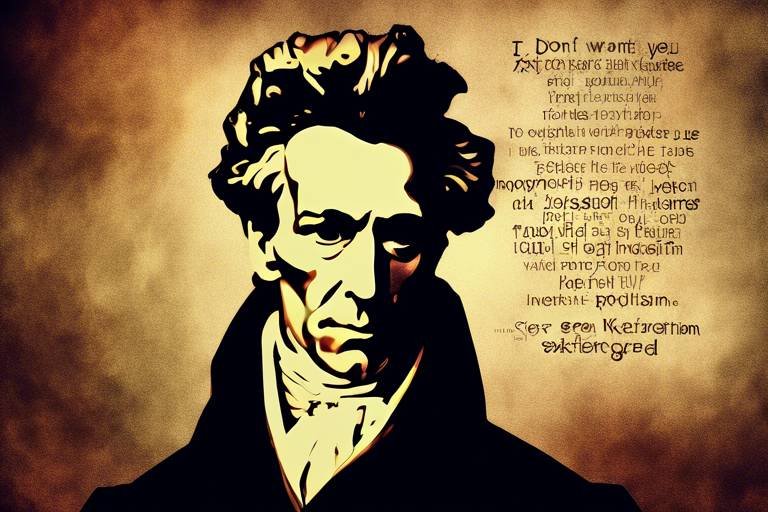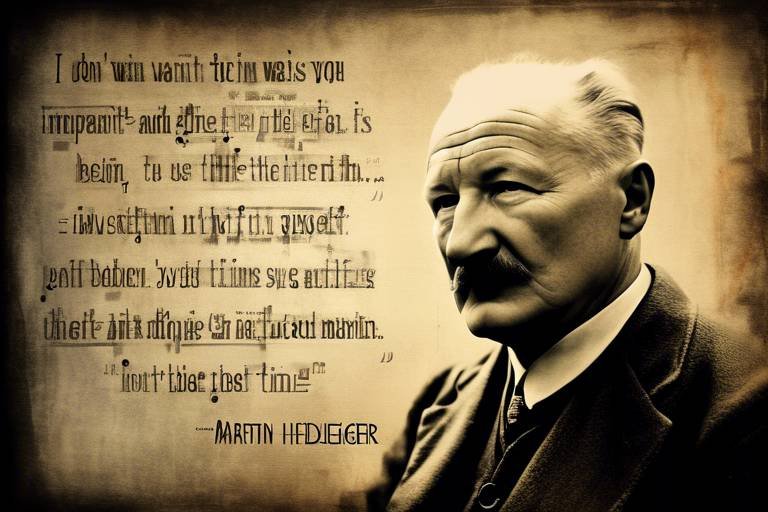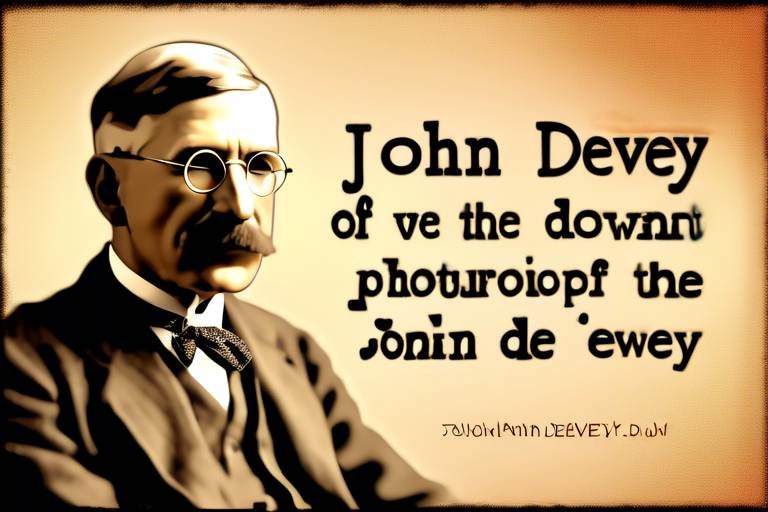Philosophy of Science: A Study in Karl Popper's Falsification Theory
The philosophy of science is a fascinating realm where thinkers have grappled with the nature of knowledge, truth, and the scientific method. Among these thinkers, Karl Popper stands out for his groundbreaking ideas, particularly his falsification theory. This theory revolutionized the way we think about science, emphasizing that for a theory to be considered scientific, it must be testable and refutable. In this article, we will explore the implications of Popper's work, particularly how it addresses the demarcation problem—the challenge of distinguishing science from non-science—and its lasting impact on modern scientific inquiry.
Falsification is not merely a technical term; it is a profound shift in perspective. Imagine a scientist standing at the edge of a vast ocean of knowledge, armed with a fishing rod that represents their hypothesis. Instead of casting their line and hoping to catch anything that swims by, they must seek out the elusive creatures that can challenge their understanding. This is the essence of falsification: actively looking for evidence that could disprove a theory rather than simply seeking confirmation. The beauty of this approach lies in its ability to propel science forward, encouraging researchers to refine their ideas continuously.
One of the most significant contributions of Popper's falsification theory is its role in addressing the demarcation problem. This problem has long puzzled philosophers and scientists alike: how do we differentiate between what is genuinely scientific and what is not? Popper proposed that the criterion for scientific legitimacy lies in a theory's ability to be tested and potentially falsified. In other words, a theory that cannot be subjected to rigorous testing falls outside the realm of science. This perspective reshapes not only our understanding of scientific inquiry but also the very foundation of scientific discourse.
However, while Popper's ideas have been influential, they are not without their critiques. Some argue that relying solely on falsification as a demarcation criterion is problematic. For instance, many scientific theories, especially in fields like psychology or social sciences, often deal with complex systems that may not yield straightforward falsifiable predictions. This raises questions about the applicability of Popper's framework across various disciplines. Are there instances where a theory may hold value despite not being easily falsifiable?
In response to these critiques, philosophers have proposed alternative approaches to demarcation. For example, some suggest that a combination of methods, including verification and falsification, may provide a more nuanced understanding of scientific validity. Others argue for a contextual approach, where the criteria for scientific legitimacy may vary across different fields. This ongoing debate highlights the dynamic nature of the philosophy of science, where ideas continue to evolve and adapt to new challenges.
To illustrate the complexities of the demarcation problem, let's consider some case studies of scientific theories that challenge the boundaries of falsification. For example, theories in quantum mechanics often defy classical notions of falsifiability, leading to ongoing discussions about their scientific status. Similarly, the debate surrounding string theory raises questions about how we define scientific theories in the absence of direct empirical evidence. These examples underscore the need for an open dialogue about the criteria we use to evaluate scientific claims.
Moving beyond theory, it's essential to explore how falsification operates in practice. In the real world, scientists engage in a rigorous process of hypothesis testing, where they actively seek out data that could potentially refute their claims. This iterative nature of scientific discovery is what drives innovation. For instance, when a new drug is developed, researchers conduct extensive trials not only to confirm its efficacy but also to identify any potential side effects that could challenge its safety. This proactive approach is a testament to the power of falsification in shaping scientific research.
Ultimately, Popper's influence on scientific methodology cannot be overstated. His ideas have profoundly shaped the way researchers approach their work, fostering a culture of skepticism and critical inquiry. By encouraging scientists to embrace the possibility of being wrong, Popper's theory has paved the way for more robust and reliable scientific practices. Today, his legacy is evident in ongoing debates within the philosophy of science, where contemporary thinkers continue to engage with his ideas and explore their relevance in the ever-evolving landscape of scientific discourse.
As we reflect on the impact of Popper's falsification theory, it's clear that the philosophy of science remains a vibrant and dynamic field. The questions it raises about the nature of knowledge, truth, and scientific inquiry are as relevant today as they were in Popper's time. In a world where information is abundant and often conflicting, understanding the principles of scientific legitimacy is more crucial than ever.
- What is Karl Popper's falsification theory?
Falsification theory posits that for a theory to be considered scientific, it must be testable and capable of being proven false. - Why is falsification important in science?
Falsification encourages rigorous testing and critical thinking, driving scientific progress by prompting researchers to refine their hypotheses. - What is the demarcation problem?
The demarcation problem addresses the challenge of distinguishing between science and non-science, a critical issue in the philosophy of science. - Are there criticisms of Popper's theory?
Yes, some critics argue that relying solely on falsification may overlook valuable theories that are not easily testable, particularly in the social sciences. - How has Popper's work influenced modern science?
Popper's ideas have shaped scientific methodology, promoting a culture of skepticism and continuous inquiry in research practices.

Understanding Falsification
Falsification is a cornerstone of Karl Popper's philosophy of science, representing a radical shift in how we think about scientific theories. At its core, falsification posits that for a theory to be considered scientific, it must be testable and refutable. This means that there should be a conceivable observation or experiment that could prove the theory wrong. Imagine a scientist proposing that all swans are white; this theory is scientific because it can be disproven by the discovery of just one black swan. In contrast, a theory that cannot be tested or potentially disproven, such as the existence of a deity, falls outside the realm of scientific inquiry.
Popper's approach was revolutionary because it challenged the traditional view of science, which often relied on verification. Instead of accumulating evidence to support a theory, Popper argued that the strength of a scientific theory lies in its ability to withstand attempts at falsification. This perspective encourages a more dynamic understanding of science, where theories are constantly put to the test and refined based on new evidence. The implications of this are profound; scientific progress is not merely about proving ideas correct, but about rigorously challenging them and seeking out their limitations.
To further illustrate the importance of falsification in scientific practice, consider these key points:
- Hypothesis Testing: Falsification emphasizes the need for clear, testable hypotheses that can be examined through experiments or observations.
- Scientific Rigor: By focusing on falsifiability, scientists are encouraged to design experiments that challenge existing theories, fostering a culture of skepticism and inquiry.
- Dynamic Nature of Science: The process of science is iterative; theories evolve as new data emerges, leading to more refined understandings of the natural world.
Moreover, falsification plays a crucial role in distinguishing between scientific and non-scientific claims. When we assess the validity of a theory, we must ask ourselves: Can it be tested? Can it be proven wrong? If the answer is no, then we are not dealing with a scientific theory, but rather a belief or a hypothesis that lacks empirical grounding. This demarcation is essential for maintaining the integrity of scientific inquiry and ensuring that we rely on robust, evidence-based conclusions.
In summary, understanding falsification is fundamental to grasping the essence of scientific inquiry. It not only highlights the importance of testability in theories but also underscores the dynamic, evolving nature of science itself. As we navigate through various scientific disciplines, keeping the principle of falsification at the forefront will help us appreciate the rigorous processes that underpin scientific discoveries.

The Demarcation Problem
The demarcation problem is a fundamental issue in the philosophy of science, primarily concerned with distinguishing between what constitutes science and what does not. Karl Popper, with his revolutionary ideas, tackled this problem head-on by proposing falsification as a criterion for scientific legitimacy. In essence, Popper argued that for a theory to be considered scientific, it must be testable and refutable. This means that there must be a possible observation or experiment that could prove the theory false. Imagine a world where every claim could be validated without the possibility of disproval; it would be like standing on quicksand—no solid ground to anchor our understanding of reality.
Popper's approach to the demarcation problem not only sought to clarify what science is, but also aimed to elevate the standards of scientific inquiry. By insisting that scientific theories must be open to scrutiny and potential falsification, he encouraged a culture of skepticism and rigorous testing. This is crucial because, in the absence of such a criterion, we might find ourselves mired in pseudoscience, where claims are made without the possibility of being tested or disproven. Think of it like a game of chess; if you don’t have a way to checkmate your opponent, the game loses its meaning and structure.
However, the application of falsification as a demarcation criterion is not without its challenges. Critics argue that there are many scientific theories that do not easily lend themselves to falsification. For instance, theories in fields like astrophysics and psychology often deal with phenomena that are not directly observable or easily testable. This raises the question: can we truly rely on falsification as the sole method for distinguishing science from non-science? The implications of this debate extend beyond philosophy and into the realms of education, policy-making, and public understanding of science.
To better illustrate the nuances of the demarcation problem, consider the following table that outlines various theories and their status in relation to falsifiability:
| Theory | Falsifiable? | Field |
|---|---|---|
| Einstein's Theory of Relativity | Yes | Physics |
| Freudian Psychoanalysis | No | Psychology |
| String Theory | Debated | Theoretical Physics |
| Climate Change Models | Yes | Environmental Science |
This table highlights the complexity of applying falsification universally. While some theories, like Einstein's Theory of Relativity, are easily testable, others, such as Freudian Psychoanalysis, struggle with the criteria of falsifiability. This inconsistency leads to ongoing debates about the boundaries of scientific inquiry.
In conclusion, the demarcation problem remains a dynamic and contentious aspect of the philosophy of science. While Popper's falsification provides a valuable framework, it is essential to recognize its limitations and consider the diverse methodologies employed across various scientific disciplines. As we continue to explore the nature of scientific inquiry, the conversation around what constitutes science versus non-science will undoubtedly evolve, reflecting the complexities of our understanding of the universe.

Critiques of Demarcation
Despite the profound influence of Karl Popper's falsification theory, it has not escaped criticism. Many philosophers and scientists have raised concerns about the practicality and sufficiency of using falsification as a singular criterion for demarcating science from non-science. One of the primary critiques revolves around the idea that falsification can be too restrictive, potentially excluding theories that are scientifically valuable yet not easily testable. For instance, theories in fields like theoretical physics or cosmology often deal with phenomena that are difficult to observe or replicate, making them challenging to falsify.
Moreover, critics argue that Popper's model does not adequately account for the complexities and nuances involved in scientific practice. Science is not always a straightforward process of hypothesis testing; it often involves a web of interconnected theories and assumptions. This interconnectedness can make it difficult to isolate a single hypothesis for testing. As a result, some scientists advocate for a more holistic approach to scientific inquiry that considers the broader context in which theories operate.
Another significant point of contention is the issue of ad hoc modifications. Critics contend that scientists often modify their theories in response to falsifying evidence, creating what is known as an "ad hoc" hypothesis. This can lead to a situation where a theory is adjusted so extensively that it loses its predictive power, yet remains unfalsified. This raises the question: if a theory can be endlessly modified to fit observations, does it still hold scientific merit? In essence, this critique challenges the idea that falsification alone can serve as a reliable guide to scientific legitimacy.
In addition, the demarcation problem itself is often seen as a philosophical puzzle rather than a practical tool. Some argue that attempting to create a strict line between science and non-science could be counterproductive, as it may overlook the valuable insights that can emerge from interdisciplinary research. For example, fields like psychology and sociology often blend scientific methods with qualitative approaches, leading to rich, nuanced understandings of human behavior that might not fit neatly into Popper's framework.
To illustrate these critiques, consider the following table summarizing key arguments against Popper's demarcation criteria:
| Critique | Description |
|---|---|
| Restrictiveness | Falsification may exclude valuable scientific theories that are not easily testable. |
| Complexity of Science | Scientific practice often involves interconnected theories, complicating the isolation of hypotheses. |
| Ad Hoc Modifications | Endless adjustments to theories can undermine their predictive power. |
| Philosophical Puzzle | Demarcation might overlook valuable insights from interdisciplinary research. |
In conclusion, while Popper's falsification theory has significantly shaped the philosophy of science, it is essential to recognize its limitations. The critiques of demarcation highlight the complexity of scientific inquiry and suggest that a more nuanced approach may be necessary to fully understand the nature of science. As we continue to explore the boundaries of scientific legitimacy, these discussions remind us that the pursuit of knowledge is often messy, multifaceted, and far from straightforward.
- What is the main idea behind Karl Popper's falsification theory?
Popper's falsification theory posits that for a theory to be considered scientific, it must be testable and capable of being proven false.
- Why is the demarcation problem important?
The demarcation problem addresses the challenge of distinguishing between scientific and non-scientific claims, which is crucial for the credibility of scientific inquiry.
- What are some criticisms of falsification?
Critics argue that falsification can be too restrictive, fails to account for the complexity of scientific practice, and does not adequately address the issue of ad hoc modifications.
- Are there alternative methods for demarcating science?
Yes, various philosophers propose alternative approaches that consider the broader context of scientific theories and methodologies.

Alternative Approaches
While Karl Popper's falsification theory has been a cornerstone in the philosophy of science, it's essential to recognize that it isn't the only game in town. Various philosophers have proposed alternative approaches to demarcate science from non-science, each bringing its unique perspective and addressing some of the limitations inherent in Popper's framework. For instance, the verification principle, championed by members of the Vienna Circle, suggests that a statement is only meaningful if it can be verified through empirical observation. This stands in contrast to Popper's emphasis on falsifiability, shifting the focus from what can be disproven to what can be confirmed.
Another notable approach is Thomas Kuhn's paradigm shifts. Kuhn argued that science progresses through a series of revolutions, or paradigm shifts, rather than through a linear accumulation of knowledge. In his view, the scientific community operates within dominant paradigms that shape what is considered valid science. These paradigms can only be overturned when anomalies arise that cannot be explained within the existing framework, leading to a new paradigm that redefines scientific inquiry.
Additionally, Imre Lakatos introduced the concept of research programs, which combines elements of both Popper and Kuhn. He proposed that scientific theories are not tested in isolation but rather as part of a broader research program that includes a series of theories and auxiliary hypotheses. This means that scientists may defend a theory by modifying its auxiliary hypotheses instead of discarding it entirely, allowing for a more nuanced understanding of scientific progress.
Moreover, Paul Feyerabend took a more radical stance, advocating for a pluralistic approach to science. He famously declared, "Anything goes," suggesting that there is no single scientific method that can be universally applied. Feyerabend argued that the diversity of scientific practices and methodologies enriches the scientific enterprise, allowing for creativity and innovation beyond rigid frameworks.
These alternative approaches highlight the complexity of scientific inquiry and the ongoing debates surrounding the demarcation problem. Each theory offers valuable insights into how we understand science and its methodologies, reminding us that the landscape of scientific philosophy is rich and multifaceted. As we navigate through these various perspectives, it becomes clear that while falsification provides a solid foundation, it is not the only lens through which we can examine the nature of scientific inquiry.
In conclusion, the exploration of alternative approaches to demarcation not only enhances our understanding of science but also encourages a broader dialogue about what constitutes valid scientific practice. By embracing a variety of philosophical perspectives, we can cultivate a more inclusive and dynamic view of science that reflects its true nature—a constantly evolving pursuit of knowledge.

Case Studies in Demarcation
When it comes to understanding the nuances of demarcation in scientific inquiry, case studies serve as illuminating examples. These instances not only highlight the complexities of distinguishing science from non-science but also reveal the limitations of Karl Popper's falsification theory. Let's delve into a few compelling case studies that illustrate these challenges.
One of the most frequently discussed examples is the theory of psychology. While psychology employs scientific methods, its theories often lack the robust testability that Popper championed. Take, for instance, Freudian psychoanalysis. Proponents argue that it offers profound insights into human behavior, yet its core concepts, such as the unconscious mind, are notoriously difficult to falsify. If a patient experiences a breakthrough, it can be seen as evidence supporting the theory, but if they do not, the theory can be adjusted to account for this failure, thereby escaping falsification. This raises an intriguing question: is psychology a science, or does it tread the line of pseudoscience?
Another fascinating case study is astrology. While astrology claims to provide insights into personality and predict future events based on celestial positions, it consistently fails to meet the criteria of falsification. Numerous studies have attempted to test astrological predictions against real-world outcomes, and the results have shown no statistically significant correlation. Despite this, astrology remains popular among many, leading us to ponder: why do people cling to beliefs that lack scientific backing?
In the realm of climate science, we find another compelling case. Theories about climate change are grounded in extensive empirical research and data collection. However, skeptics often argue that certain aspects of climate modeling are not falsifiable. For example, predictions about future climate scenarios are inherently uncertain, as they depend on numerous variables and assumptions. This has sparked debates about whether climate science meets Popper's stringent criteria for scientific legitimacy. The ongoing discussions illustrate how even well-established fields can grapple with demarcation issues.
To further illustrate these complexities, consider the following table summarizing these case studies:
| Field | Theory | Falsifiability | Demarcation Status |
|---|---|---|---|
| Psychology | Freudian Psychoanalysis | Difficult to test; adaptable | Controversial |
| Astrology | Astrological Predictions | Fails empirical testing | Pseudoscience |
| Climate Science | Climate Change Models | Inherently uncertain | Scientific but debated |
These case studies underscore the reality that demarcation is not a straightforward task. As we explore the boundaries between science and non-science, we must consider the broader implications of these distinctions. What criteria can we use to evaluate claims? How do we balance the need for rigorous testing with the recognition that some fields may not neatly fit into Popper's framework? These questions continue to fuel discussions in the philosophy of science, reminding us that the pursuit of knowledge is as complex as the phenomena we study.
- What is the main idea behind Karl Popper's falsification theory?
Popper's falsification theory asserts that for a theory to be considered scientific, it must be testable and refutable. This means that there should be a possibility of proving the theory wrong through observation or experimentation. - How does falsification differ from verification?
Verification attempts to confirm a theory by providing supporting evidence, while falsification seeks to disprove a theory. Popper believed that scientific progress occurs through the elimination of false theories rather than the accumulation of confirming evidence. - Why is the demarcation problem significant?
The demarcation problem is crucial because it helps differentiate between scientific knowledge and non-scientific beliefs. Understanding this distinction is essential for evaluating the credibility of various claims and theories.

Falsification in Practice
Falsification is not just a theoretical concept; it plays a crucial role in the day-to-day operations of scientific inquiry. Imagine a detective on a mission to solve a mystery. Every clue they gather must either lead them closer to the truth or be discarded as irrelevant. Similarly, scientists use falsification to sift through hypotheses, determining which theories hold water and which sink under scrutiny. This process is fundamental to the scientific method, where theories are rigorously tested against observable phenomena.
In practice, falsification manifests through systematic experimentation and observation. Scientists propose hypotheses that make specific predictions. For instance, if a biologist hypothesizes that a certain drug will lower blood pressure, the next step is to design an experiment to test this claim. If the results show no significant change in blood pressure, the hypothesis is falsified, forcing the researcher to reconsider their assumptions. This iterative cycle of proposing, testing, and revising is what propels scientific progress.
Moreover, falsification encourages a culture of skepticism and critical thinking. In a laboratory setting, researchers are often required to present their findings to peers for review. This peer review process serves as a safeguard against unfounded claims and promotes a rigorous examination of evidence. As scientists challenge each other's work, they contribute to a collective understanding that is always evolving. The table below illustrates the key steps involved in the process of falsification:
| Step | Description |
|---|---|
| 1. Hypothesis Formation | Scientists develop a testable hypothesis based on observations. |
| 2. Experiment Design | Experiments are designed to test the hypothesis under controlled conditions. |
| 3. Data Collection | Data is gathered through observation and experimentation. |
| 4. Analysis | Results are analyzed to determine if they support or contradict the hypothesis. |
| 5. Conclusion | Based on the analysis, the hypothesis is either accepted or falsified. |
It's fascinating to consider how this approach has led to significant breakthroughs in various fields. For example, the realm of physics has seen the development of theories such as relativity and quantum mechanics, both of which have undergone rigorous testing and falsification. In medicine, the efficacy of treatments is constantly evaluated through clinical trials, where the goal is to falsify ineffective hypotheses. Each failed hypothesis is not a setback but a stepping stone toward deeper understanding.
However, it's essential to recognize the limitations of falsification in practice. Not all scientific questions can be neatly categorized as true or false. Some theories may be difficult to test due to ethical considerations or the complexity of the phenomena involved. For instance, consider the challenges faced in psychological studies where human behavior can be unpredictable. In such cases, researchers might rely on a combination of falsification and other methodologies to draw conclusions.
In conclusion, while falsification is a powerful tool in the scientific arsenal, it is not the only one. The interplay between falsification, observation, and theoretical development creates a rich tapestry of scientific inquiry. As we continue to explore the unknown, the principles of falsification will remain a guiding light, helping us navigate the complexities of the universe.
- What is falsification? Falsification is the principle that for a theory to be scientific, it must be testable and refutable.
- Why is falsification important in science? It encourages rigorous testing and critical examination of theories, leading to more reliable scientific knowledge.
- Are there limitations to falsification? Yes, some theories may be difficult to test, and not all scientific inquiries fit neatly into true/false categories.
- How does falsification relate to the scientific method? Falsification is a key component of the scientific method, guiding researchers in hypothesis testing and theory development.
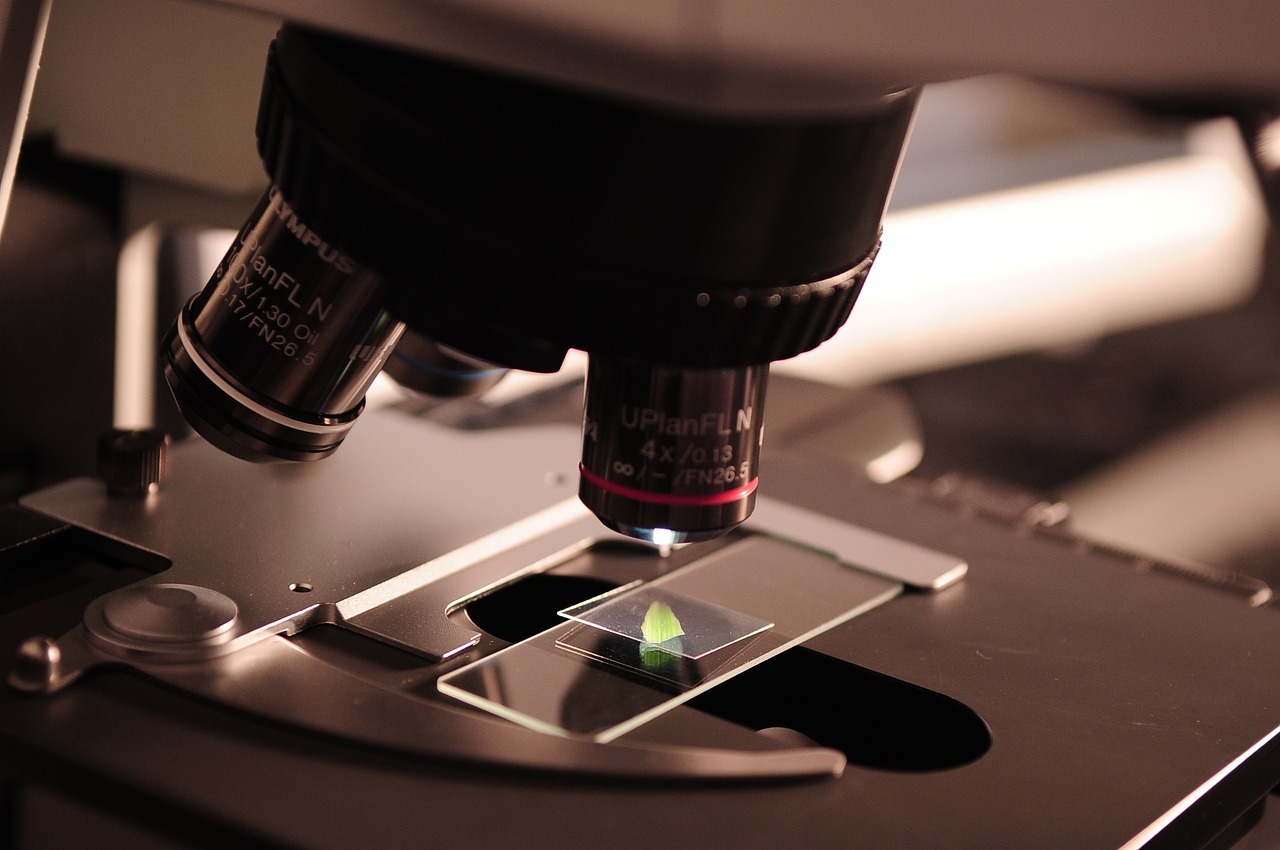
Popper’s Influence on Scientific Methodology
Karl Popper's influence on scientific methodology is nothing short of revolutionary. His ideas have fundamentally reshaped how scientists approach research, testing, and the validation of theories. At the heart of Popper's philosophy lies the principle of falsifiability, which asserts that for a theory to be considered scientific, it must be able to be tested and potentially proven false. This concept has encouraged scientists to formulate hypotheses that are not only bold but also rigorous, pushing the boundaries of what we understand about the world.
One of the most significant contributions of Popper's work is the emphasis on the iterative nature of scientific discovery. Rather than viewing scientific inquiry as a linear process where theories are simply confirmed, Popper introduced the idea that science is a dynamic and ongoing dialogue between theory and observation. This means that scientists must constantly challenge their own ideas and remain open to new evidence that may contradict their findings. In this way, Popper's philosophy fosters a culture of skepticism and critical thinking, which is essential for scientific progress.
Furthermore, Popper's influence extends to the design of experiments. By advocating for hypotheses that can be rigorously tested, he has inspired researchers to create experimental frameworks that are both robust and reliable. For instance, when designing an experiment, scientists are encouraged to think critically about how their hypotheses can be tested and what constitutes sufficient evidence to support or refute them. This has led to a more disciplined approach to scientific inquiry, where empirical evidence takes precedence over mere speculation.
To illustrate Popper's impact, consider the following table that outlines key aspects of his influence on scientific methodology:
| Aspect | Description |
|---|---|
| Falsifiability | The criterion that a scientific theory must be testable and capable of being proven false. |
| Iterative Process | Science as a continuous cycle of hypothesis, testing, and revision. |
| Experimental Design | Encouragement of rigorous testing and critical evaluation of hypotheses. |
| Cultural Impact | Promotion of skepticism and critical thinking within the scientific community. |
Popper's ideas have not only shaped the scientific method but have also sparked ongoing debates within the philosophy of science. Contemporary thinkers continue to engage with his work, exploring its implications in various fields, including psychology, sociology, and even the natural sciences. As we navigate the complexities of modern research, Popper’s emphasis on falsification remains a guiding principle, reminding us that the pursuit of knowledge is as much about questioning and testing as it is about discovery.
In conclusion, Karl Popper's influence on scientific methodology is profound and enduring. His contributions encourage a rigorous, critical, and dynamic approach to science that remains relevant today. As we continue to explore the intricacies of scientific inquiry, Popper's legacy serves as a beacon, guiding researchers through the complex landscape of knowledge and understanding.
- What is falsifiability? Falsifiability is the principle that a scientific theory must be testable and capable of being proven false.
- How did Popper influence scientific methodology? He emphasized the importance of hypothesis testing, critical thinking, and the iterative nature of scientific discovery.
- Why is Popper's work still relevant today? His ideas promote a rigorous and skeptical approach to scientific inquiry, which is essential for progress in various fields.
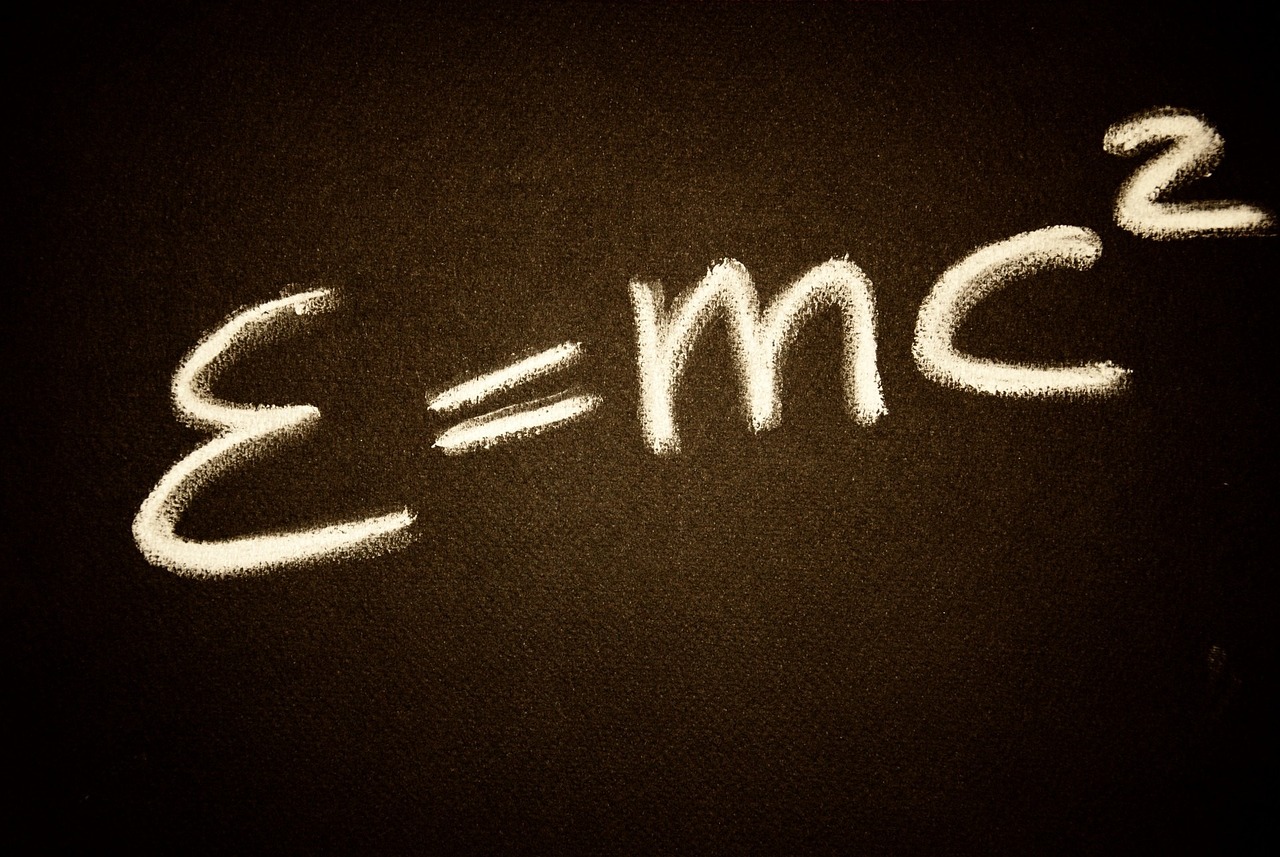
Impact on Experimental Design
The philosophy of science, particularly Karl Popper's falsification theory, has had a profound impact on how we approach experimental design. At its core, Popper's assertion that scientific theories must be testable and refutable has led to a shift in the way researchers formulate their hypotheses and structure their experiments. Instead of merely seeking to confirm existing theories, scientists are encouraged to design experiments that actively seek to disprove their hypotheses. This is akin to a detective looking for clues that could unravel a case, rather than just gathering evidence that supports their initial assumptions.
In practical terms, this means that experimental designs must incorporate elements that allow for clear and definitive testing of hypotheses. For instance, a well-structured experiment will include control groups, randomization, and blinding to minimize bias and ensure that the results are as objective as possible. By focusing on the possibility of falsification, researchers can create conditions under which their theories can be rigorously challenged. This leads to a more dynamic and iterative process of scientific inquiry, where theories are constantly being tested, refined, or rejected based on empirical evidence.
Moreover, the emphasis on falsification has implications for the types of questions scientists pursue. Researchers are more likely to ask questions that are specific, measurable, and capable of being tested through experimentation. This focus fosters a culture of critical thinking and skepticism, which is essential for scientific progress. In this context, the design of experiments becomes not just a technical challenge, but a philosophical one as well. Scientists must continually ask themselves: “What would it take to prove my theory wrong?” This mindset not only enhances the rigor of scientific research but also encourages innovation and creativity in experimental design.
To illustrate this impact, consider the following table, which outlines the key components of experimental design influenced by Popper's falsification principle:
| Component | Description | Falsification Relevance |
|---|---|---|
| Hypothesis Formulation | Clear, testable statements predicting outcomes | Must be structured to allow for potential disproof |
| Control Groups | Groups that do not receive the experimental treatment | Essential for isolating variables and testing effects |
| Randomization | Random assignment of subjects to groups | Reduces bias and increases validity of results |
| Blinding | Participants or researchers unaware of group assignments | Helps prevent bias in data collection and analysis |
As we can see, each component of experimental design is intricately linked to the principles of falsification. By adhering to these guidelines, scientists not only enhance the credibility of their findings but also contribute to a more robust body of scientific knowledge. The legacy of Popper's ideas continues to resonate in laboratories around the world, shaping the way researchers think about and conduct their experiments.
In conclusion, the impact of Popper's falsification theory on experimental design cannot be overstated. It has transformed the scientific landscape, encouraging a more rigorous and critical approach to research. As we move forward, the challenge remains for scientists to embrace this philosophy, continually refining their methods and questioning their assumptions in the pursuit of knowledge.
- What is falsification in scientific research? Falsification is the principle that scientific theories must be testable and capable of being proven wrong. It encourages scientists to design experiments that can potentially disprove their hypotheses.
- How does falsification influence experimental design? Falsification influences experimental design by promoting the creation of testable hypotheses, control groups, and methods that minimize bias, ensuring that results are reliable and objective.
- Why is falsification important in science? Falsification is important because it helps distinguish scientific theories from non-scientific claims, fostering a rigorous and critical approach to scientific inquiry.

Legacy and Ongoing Debates
When we think about Karl Popper, it's hard not to recognize the profound impact he has had on the philosophy of science. His notion of falsification not only reshaped how we understand scientific inquiry but also sparked a myriad of debates that continue to resonate today. Popper's legacy is like a ripple in a pond—each wave represents a different aspect of scientific thought that has been influenced by his ideas.
One of the most significant aspects of Popper's legacy is his challenge to the traditional view of science as a process of verification. Instead, he proposed that science should focus on bold conjectures and rigorous attempts to disprove them. This radical shift has led to ongoing discussions among philosophers and scientists alike. For instance, many still grapple with the question: Is science truly only about falsifiability, or are there other criteria that should be considered?
In contemporary debates, Popper’s ideas are often juxtaposed with those of other philosophers. Thomas Kuhn, for example, introduced the concept of paradigm shifts, suggesting that scientific progress is not always linear and that scientists often work within established frameworks that resist falsification. This has led to a rich dialogue about the nature of scientific revolutions and whether Popper's model can adequately explain the complexities of scientific development.
Moreover, the rise of scientific realism and constructivism has further complicated the landscape. Some argue that Popper's emphasis on falsification overlooks how scientific theories can be shaped by social and cultural factors. In light of this, many contemporary thinkers are exploring how to integrate Popper's insights with these newer perspectives. For example, the question of whether scientific theories can be considered valid if they are not easily falsifiable is a hot topic among scholars.
To illustrate the ongoing debates surrounding Popper’s legacy, consider the following table that outlines some of the key contrasting views:
| Philosopher | Key Idea | Relation to Popper |
|---|---|---|
| Karl Popper | Falsification as a criterion for scientific validity | Proposes that scientific theories must be testable and refutable |
| Thomas Kuhn | Paradigm shifts | Challenges the linear view of scientific progress; emphasizes the role of community consensus |
| Imre Lakatos | Research programmes | Suggests that science progresses through competing research programmes rather than strict falsification |
| Paul Feyerabend | Epistemological anarchism | Argues against the strict methodologies proposed by Popper, advocating for a more pluralistic approach |
As we delve deeper into these discussions, it's evident that Popper's influence remains a cornerstone of the philosophy of science. His ideas encourage critical thinking and skepticism, pushing scientists and philosophers to constantly question and refine their understanding of what constitutes valid scientific inquiry. Whether one agrees with Popper or not, his work undeniably fuels the fires of debate, prompting us to explore the very essence of science itself.
In conclusion, while Popper's falsification theory may not provide all the answers, it serves as a vital starting point for discussions about the nature of science. As we continue to navigate the complexities of scientific inquiry, engaging with Popper's legacy will remain essential for anyone interested in understanding the dynamic interplay between theory and practice in the scientific realm.
- What is Karl Popper's main contribution to the philosophy of science?
Popper's main contribution is the concept of falsification, which asserts that scientific theories should be testable and refutable.
- How does Popper's view differ from traditional scientific methods?
Unlike traditional methods that focus on verification, Popper emphasized the importance of attempting to disprove theories.
- What are some criticisms of Popper's falsification theory?
Critics argue that falsification may not adequately account for the complexities of scientific practice and the role of social factors in shaping scientific theories.
- How has Popper's work influenced modern scientific methodology?
Popper's ideas continue to shape scientific methodology by promoting rigorous testing and the formulation of hypotheses that can be empirically challenged.
Frequently Asked Questions
- What is Karl Popper's falsification theory?
Karl Popper's falsification theory is a philosophical principle that suggests scientific theories must be testable and capable of being proven false. Rather than confirming theories through repeated observations, Popper believed that the strength of a theory lies in its ability to withstand attempts to falsify it.
- Why is falsification important in scientific inquiry?
Falsification is crucial because it provides a clear criterion for distinguishing scientific statements from non-scientific ones. It encourages scientists to formulate hypotheses that can be rigorously tested, ultimately leading to more robust and reliable scientific knowledge.
- What is the demarcation problem?
The demarcation problem refers to the challenge of distinguishing between science and non-science. Popper's falsification theory offers a solution by suggesting that a theory must be falsifiable to be considered scientific, thus providing a framework for evaluating the legitimacy of various fields of inquiry.
- What are some critiques of Popper's demarcation criteria?
Critics argue that falsification may be too rigid and does not account for the complexities of scientific practice. Some suggest that certain scientific theories, like those in the social sciences, may not be easily falsifiable, raising questions about the applicability of Popper's criteria across all disciplines.
- Are there alternative approaches to demarcating science?
Yes, various philosophers have proposed alternative methods for demarcation, including verificationism and the use of scientific paradigms. These approaches offer different perspectives on what constitutes scientific legitimacy and highlight the ongoing debates within the philosophy of science.
- How is falsification applied in real-world scientific research?
Falsification is applied in scientific research through hypothesis testing. Researchers design experiments to challenge their hypotheses, seeking evidence that could potentially disprove them. This iterative process is essential for scientific discovery and helps refine our understanding of the natural world.
- What impact has Popper had on scientific methodology?
Popper's ideas have significantly influenced scientific methodology by promoting rigorous testing and critical thinking. His emphasis on falsifiability encourages researchers to remain open to new evidence and to continuously question and refine their theories.
- How does Popper's legacy affect contemporary philosophy of science?
Popper's legacy is evident in ongoing debates within the philosophy of science. Contemporary thinkers continue to engage with his ideas, exploring the relevance of falsification in light of new scientific developments and methodologies, thus keeping his influence alive in modern discourse.

